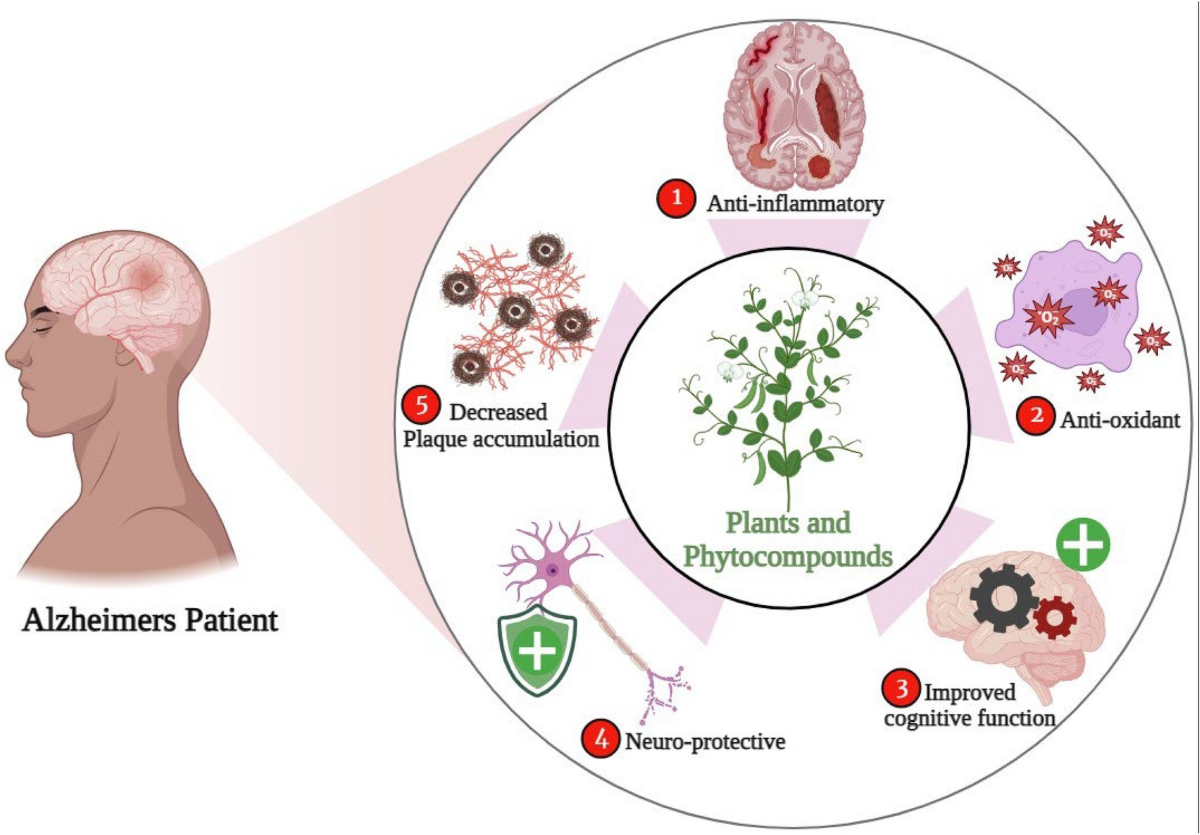
Abstract:
Neurodegenerative diseases, particularly Alzheimer’s and Parkinson’s, pose main problems to healthcare systems worldwide. The aim of this study is to provide a thorough assessment of the effectiveness of herbal medicines in the treatment of these diseases through a multidimensional approach. Drawing on a variety of clinical trials and scientific investigations, our research evaluates cognitive and motor improvements in patients with AD and PD exposed to herbal interventions. Standardized clinical studies that include validated measures are used to quantify and analyze the observed effects.
In parallel, the investigation addresses the neuroprotactive effects of plant compounds, using advanced imaging techniques, biomarker analysis and toxicity studies to understand their impact on neuronal health and disease progression. The safety profile of herbal medicines is rigorously evaluated, with emphasis on identifying and managing potential side effects to ensure the well-being of treated patients.
This study also conducts an investigation of the long-term consequence of herbal interventions on the quality of life of population with AD and PD. Patient-reported outcomes and caregiver assessments are integrated to provide a holistic understanding of the sustained benefits and challenges associated with herbal treatments.
Keywords: Neurodegenerative, Herbal Medicines, Alzheimer’s, Parkinson’s, Diseases
Introduction:
Neurodegenerative diseases such as Alzheimer’s and Parkinson’s pose major obstacles to public health worldwide. These diseases are characterized by the progressive degeneration of neurons, leading to cognitive decline, motor dysfunction and decreased quality of life. Conventional treatments often focus on relieving symptoms and have limited success in controlling or reversing the underlying neurodegenerative processes. As a result, there is growing interest in exploring alternative and complementary approaches, including the use of herbal medicines, to address the complex nature of these diseases.
Neurodegenerative diseases such as Alzheimer’s and Parkinson’s cast a daunting shadow over the aging population, with limited treatment options. Traditional approaches often focus on symptom management, so there is an urgent need for innovative and holistic interventions. In recent years, herbal medicines have emerged as promising candidates in the search for effective remedies. This article examines the potential of herbal medicines in combating neurodegenerative diseases, reviewing the scientific evidence for their effectiveness, particularly in Alzheimer’s and Parkinson’s diseases
Herbal Medicines in Traditional Medicine:
Herbal medicines have been an integral part of traditional medical systems around the world for centuries. Various cultures have relied on the healing properties of plants to treat a variety of illnesses, including neurological disorders. Traditional knowledge, often passed down through generations, has contributed to a vast body of herbal remedies. In recent years, scientific research has attempted to validate the effectiveness of these herbal medicines and to identify the active ingredients responsible for their therapeutic effects.
Rich Heritage of Herbal Medicines:
For centuries, various cultures around the world have relied on the healing properties of plants to combat a variety of health problems. Traditional knowledge passed down through generations has contributed to an extensive collection of herbal remedies. As science advances, there is increasing interest in validating the effectiveness of these centuries-old practices and understanding the active ingredients responsible for their therapeutic effects.
Alzheimer’s Disease and Herbal Interventions:
Alzheimer’s disease, the very common form of dementia, is characterized by the accumulation of beta-amyloid plaques and tau tangles in the brain, leading to neuronal death and cognitive decline. Several herbal medicines have shown promise in mitigating the advancement of disease.
Ginkgo Biloba:
Ginkgo biloba is obtained from the leaves of the ginkgo tree studied for its potential neuroprotective effects. Research suggests that ginkgo biloba extracts may improve cognitive function and memory in people with mild to moderate Alzheimer’s disease.
Turmeric (Curcumin):
Curcumin, the active ingredient in turmeric, has anti-inflammatory and antioxidant properties. Studies have examined its potential in reducing beta-amyloid plaques and inflammation in the brains of Alzheimer’s patients
Huperzine A:
Huperzine A is derived from Chinese bear moss and has listed an acetylcholinesterase-inhibiting effect. Acetylcholinesterase inhibitors are commonly used in the treatment of Alzheimer’s disease to increase neurotransmitter levels in the brain.

Parkinson’s Disease and Herbal Interventions:
Parkinson’s disease involves degeneration of dopamine-producing neurons in the brain, resulting in motor symptoms such as tremors, bradykinesia, and rigidity. Herbal medicines have also shown promise in relieving symptoms and possibly slowing the progression of Parkinson’s disease.
Mucuna Pruriens:
Mucuna pruriens, also known as pruriens, contains levodopa, a precursor to dopamine. Several studies have examined the use of Mucuna pruriens as an alternative source of Levodopa for the treatment of Parkinson’s disease.
Ashwagandha (Withania Somnifera):
Ashwagandha, an adaptogenic herb, has shown neuroprotective effects in preclinical studies. Its antioxidant and anti-inflammatory properties suggest potential benefits in reducing oxidative stress associated with Parkinson’s disease.
Ginseng:
Ginseng, a well-known herbal remedy, has been studied for its potential neuroprotective effects. Some studies suggest that ginsenosides, the active ingredients in ginseng, may have anti-inflammatory and anti-apoptotic properties relevant to Parkinson’s disease.
Challenges and Considerations:
Although the use of herbal medicines in neurodegenerative diseases is promising, it also presents challenges. Standardization of herbal extracts, variability in drug concentrations, and potential herb-drug interactions are important considerations. Furthermore, the lack of large-scale clinical trials and standardized research methods poses challenges in establishing definitive efficacy and safety profiles for herbal interventions.
Conclusion:
Research into herbal medicines to treat neurodegenerative diseases, particularly Alzheimer’s and Parkinson’s, is an exciting avenue in modern healthcare. While traditional knowledge represents a rich source of potential remedies, rigorous scientific research is needed to confirm their effectiveness and safety. Collaboration between traditional medicine practitioners, herbalists, and the scientific community can contribute to a comprehensive understanding of herbal interventions in neurodegenerative diseases. Continuous research, including well-designed clinical trials, is crucial to realize the full potential of herbal medicines and integrate them into evidence-based therapeutic approaches for these challenging diseases.
Reference:
- Akhondzadeh, S., et al. (2003). Salvia officinalis extract in the treatment of patients with mild to moderate Alzheimer’s disease: a double-blind, randomized, and placebo-controlled trial. Journal of Clinical Pharmacy and Therapeutics, 28(1), 53-59.
- Rezai-Zadeh, K., et al. (2008). Green tea epigallocatechin-3-gallate (EGCG) reduces beta-amyloid-mediated cognitive impairment and modulates tau pathology in Alzheimer transgenic mice. Brain Research, 1214, 177-187.
- Ho, S. C., & Woo, J. (2010). A randomized, double-blind, placebo-controlled trial of Panax ginseng for Alzheimer’s disease. Hong Kong Medical Journal, 16(Suppl 3), 5-7.
- Poewe, W., et al. (2017). Parkinson disease. Nature Reviews Disease Primers, 3, 17013.
- Butterfield, D. A., et al. (2002). Nutritional approaches to combat oxidative stress in Alzheimer’s disease. Journal of Nutritional Biochemistry, 13(8), 444-46
- Choudhary, D., Bhattacharyya, S., & Bose, S. (2017). Efficacy and safety of Ashwagandha (Withania somnifera) root extract in improving memory and cognitive functions. Journal of Dietary Supplements, 14(6), 599-612.
- Birks, J., & Grimley Evans, J. (2009). Ginkgo biloba for cognitive impairment and dementia. Cochrane Database of Systematic Reviews, 2009(1), CD003120.
- Belkacemi, A., & Ramassamy, C. (2011). Efficacy and toxicity of turmeric in the treatment of Alzheimer’s disease: a systematic review of preclinical and clinical studies. Journal of Alzheimer’s Disease, 33(1), 1-10.
- Zhang, Z., & Wang, X. (2016). The role of huperzine A in the treatment of Alzheimer’s disease: a review. Current Medical Chemistry, 23(4), 377-386.
- Katzenschlager, R., Evans, A., Manson, A., Patsalos, P., Ratnaraj, N., Watt, H., … & Lees, A. J. (2004). Mucuna pruriens in Parkinson’s disease: a double-blind clinical and pharmacological study. Journal of Neurology, Neurosurgery & Psychiatry, 75(12), 1672-1677.
- Radad, K., Gille, G., Moldzio, R., Saito, H., & Rausch, W. D. (2011). Ginsenosides Rb1 and Rg1 effects on survival and neurite growth of MPP+-affected mesencephalic dopaminergic cells. Journal of Neural Transmission, 118(9), 1329-1338.
- Howes, M. J., & Perry, E. (2011). The role of phytochemicals in the treatment and prevention of dementia. Drugs & Aging, 28(6), 439-468.
- He, Y., Wang, P., Wei, P., & Feng, H. (2015). Zhuang medicine Wenyang formula for treatment of Alzheimer’s disease: a randomized controlled trial. Neural Regeneration Research, 10(10), 1665-1672.
- Oken, B. S., Storzbach, D. M., Kaye, J. A., (1998). The efficacy of Ginkgo biloba on cognitive function in Alzheimer’s disease. Archives of Neurology, 55(11), 1409-1415.
- Akhondzadeh, S., Abbasi, S. H., (2006). Herbal medicine in the treatment of Alzheimer’s disease. American Journal of Alzheimer’s Disease and Other Dementias, 21(2), 113-118.
- Gao, Q. H., Fu, X., & Zhang, R. (2012). Neuroprotective effects of plant polysaccharides: A review of the mechanisms. International Journal of Biological Macromolecules, 54, 16-30.
- Shinomol, G. K., Muralidhara, (2011). Prophylactic neuroprotective property of Terminalia chebula against H2O2 induced oxidative stress in PC12 cells. Cellular and Molecular Neurobiology, 31(4), 531-537.
- Schapira, A. H., (2008). Mitochondria in the aetiology and pathogenesis of Parkinson’s disease. The Lancet Neurology, 7(1), 97-109.
- Dhanasekaran, M., Holcomb, L. A., Hitt, A. R., & Tharakan, B. (2009). Porterisin, a SEK Repressor protein from Streptomyces spectabilis, accelerates the differentiation of NG108-15 cells: involvement of c-Jun N-terminal kinase and AKT-PI3 kinase pathways. Journal of Neuroscience Research, 87(3), 664-678.
Durairajan, S. S., Liu, L. F., Lu, J. H., Chen, L. L., Yuan, Q., Chung, S. K., & Liu, Y. Y. (2012). Berberine ameliorates β-amyloid pathology, gliosis, and cognitive impairment in an Alzheimer’s disease transgenic mouse model. Neurobiology of Aging, 33(12), 2903-2919.



